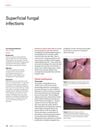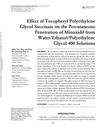 23 citations,
July 2021 in “Advances in Therapy”
23 citations,
July 2021 in “Advances in Therapy” Most people with Alopecia Areata don't get treatment within a year; it's costly and often comes with other health issues.
 54 citations,
October 2019 in “Australian Journal of General Practice”
54 citations,
October 2019 in “Australian Journal of General Practice” Accurate diagnosis and treatment are crucial for managing superficial fungal infections, with terbinafine being the best oral treatment for nail infections.
 9 citations,
November 2019 in “Scientific reports”
9 citations,
November 2019 in “Scientific reports” The AC 2 peptide from Trapa japonica fruit helps protect hair cells and may treat hair loss.
 12 citations,
March 2020 in “Journal of Bioactive and Compatible Polymers”
12 citations,
March 2020 in “Journal of Bioactive and Compatible Polymers” Nanoparticles show potential for controlled release of hair loss drugs, improving treatment effectiveness.
 13 citations,
January 2020 in “Nanoscale”
13 citations,
January 2020 in “Nanoscale” Finasteride and baicalin in phospholipid vesicles effectively promote hair growth and increase follicle count.
 9 citations,
June 2019 in “Archives of Dermatological Research”
9 citations,
June 2019 in “Archives of Dermatological Research” Both topical calcipotriol and narrowband UVB improved alopecia, but combining them didn't enhance the effect on hair loss severity, despite higher vitamin D3 levels.
 5 citations,
March 2019 in “International Journal of Endocrinology”
5 citations,
March 2019 in “International Journal of Endocrinology” Exercise and finasteride together improve ovary health in PCOS rats.
 3 citations,
June 2022 in “Dermatology and therapy”
3 citations,
June 2022 in “Dermatology and therapy” A new botanical treatment improved hair growth and symptoms in lichen planopilaris patients.
 18 citations,
March 1985 in “Journal of The American Academy of Dermatology”
18 citations,
March 1985 in “Journal of The American Academy of Dermatology” Cocaine use can cause a blistering skin disease.

Vitamin D is crucial for skin health and managing skin diseases.
 January 2024 in “Archives of dermatological research”
January 2024 in “Archives of dermatological research” Both treatments for alopecia areata showed similar modest effectiveness.
 8 citations,
January 2018 in “PubMed”
8 citations,
January 2018 in “PubMed” Smaller finasteride particles increase effectiveness in treating hair loss.
14 citations,
January 2016 in “Annals of dermatology/Annals of Dermatology” Oral cyclosporine is more effective and safer than betamethasone for treating alopecia areata.
 51 citations,
May 2010 in “Journal of Drug Targeting”
51 citations,
May 2010 in “Journal of Drug Targeting” Transcutol-containing vesicles improve minoxidil's skin penetration and hair growth promotion.
 8 citations,
February 2010 in “Journal of Dermatology”
8 citations,
February 2010 in “Journal of Dermatology” A topical treatment safely and effectively reduced acne by causing targeted cell death in sebaceous glands without side effects.
 85 citations,
January 2007 in “Journal of Drug Targeting”
85 citations,
January 2007 in “Journal of Drug Targeting” Liposomes better deliver minoxidil for hair loss treatment than niosomes.
 4 citations,
September 2020 in “Frontiers in Microbiology”
4 citations,
September 2020 in “Frontiers in Microbiology” Algal oligosaccharides help prevent hair loss and promote hair growth.
 2 citations,
July 2020 in “Journal of Drug Delivery Science and Technology”
2 citations,
July 2020 in “Journal of Drug Delivery Science and Technology” Created finasteride complex to increase water solubility and drug release.
 2 citations,
August 2023 in “Pharmaceutics”
2 citations,
August 2023 in “Pharmaceutics” New skin disease treatments using TDDS are improving but face challenges like side effects and high costs.
 1 citations,
December 2023 in “npj biofilms and microbiomes”
1 citations,
December 2023 in “npj biofilms and microbiomes” Single-cell engineered biotherapeutics show promise for skin treatment but need more research and trials.
 2 citations,
January 2011 in “Elsevier eBooks”
2 citations,
January 2011 in “Elsevier eBooks” Early treatment of acne is crucial to prevent scarring and psychological effects.
 113 citations,
August 2016 in “Mycopathologia”
113 citations,
August 2016 in “Mycopathologia” New topical antifungals and delivery systems are improving treatment for fungal skin infections, but patient education and prevention are key.
 49 citations,
November 2014 in “Journal of Medicinal Food”
49 citations,
November 2014 in “Journal of Medicinal Food” Red Ginseng Extract may help human hair grow by activating growth pathways and blocking negative effects of certain hormones.
 28 citations,
March 2017 in “Scientific Reports”
28 citations,
March 2017 in “Scientific Reports” Minoxidil may protect nerves and improve hair quality during paclitaxel treatment.
 1 citations,
January 2022 in “Journal of Pharmaceutical Sciences”
1 citations,
January 2022 in “Journal of Pharmaceutical Sciences” The new skin cream with FOL-005 safely promotes hair growth and is stable and user-friendly.
12 citations,
January 2021 in “Journal of Cutaneous and Aesthetic Surgery” Epidermal growth factor helps skin and hair regeneration but needs more research for better understanding.
 3 citations,
April 2019 in “Journal of Dermatological Treatment”
3 citations,
April 2019 in “Journal of Dermatological Treatment” Caffeine shows promise for treating some types of hair loss, but more research is needed.
 11 citations,
January 2006 in “Drug development and industrial pharmacy”
11 citations,
January 2006 in “Drug development and industrial pharmacy” Adding TPGS to minoxidil solutions can improve skin penetration and retention, especially in water and PEG 400-based solutions.
 May 2016 in “Journal of The American Academy of Dermatology”
May 2016 in “Journal of The American Academy of Dermatology” Finasteride effectively treated hidradenitis suppurativa.
 44 citations,
October 2019 in “International Journal of Molecular Sciences”
44 citations,
October 2019 in “International Journal of Molecular Sciences” Melatonin, usually known for sleep regulation, also has antioxidant properties that can protect skin, stimulate hair growth, and improve skin conditions, with topical application being more effective than oral use.



























